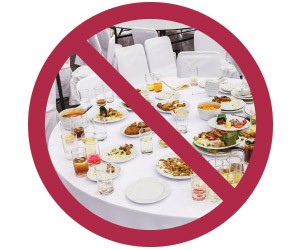Media attention frequently focuses on the amount of food wasted by individual consumers, restaurants, grocery stores and events, and rightfully so, as it is a huge social and environmental issue! As good corporate citizens, your organization will want your event to reflect its values by minimizing food waste wherever possible.
As a meeting planner, you play the leading role in minimizing food waste for your participants, venues, caterers and ultimately for your organization. There isn’t one magic bullet for solving this issue, but rather a series of choices and practices you can implement throughout your planning process.
These easy tips from my recently published book, MeetBetter: 167 Ways to Make Your Events More Environmentally and Socially Responsible, will get you started or take your efforts to the next level of sustainability.
- Donate leftover food. Some venues or caterers may have concerns about liability; however, many laws protect food donors. Contact the food bank to confirm local regulations and how to practice safe food handling.
- Carefully order food to minimize waste. Very often, event planners guarantee numbers across the board for all functions. Instead, crosscheck with your arrivals, departures and past history to make adjustments for meal functions.
- Create sustainable menu themes such as Meatless Monday, or a Blemished Buffet. High-quality food is often discarded for being imperfectly shaped or blemished. In 2013, the United Nations chose to highlight this issue by serving a five-course meal made from food that was considered to be reject-grade by the standards of European buyers. The event was for 500 delegates at a week-long United Nations Environment Programme (UNEP) event in Kenya.
- Make food and scheduling choices that consider the health, faith and values of participants. As meeting and event professionals, part of our work involves creating environments that are welcoming to all participants. Anticipating and preparing for your participant’s needs, whether they be for healthy options, menus that meet faith requirements or offering alternatives such as vegetarian menus will go a long way to creating this welcoming environment and reducing food waste.
- Serve smaller portions. Consider reducing the number of courses from four to three and serving smaller portions at each meal. Long gone are the days when heaping plates were a sign of affluence.
- Do not refresh break services and buffets until they are close to empty. Some caterers refresh with 5 percent of food remaining, so it helps to ask what the norm is. If food can be held in a nearby kitchen or hot-box you may be safe to reduce to 1 percent or less. Make sure ask for smaller refresh amounts toward the end of the function.
- Avoid presetting food (such as salads and desserts) to help minimize waste. Alternatively, only preset 80 percent of the tables and have the rest served as needed.
- Reduce plate sizes. In 2012, Nordic Choice Hotels, in cooperation with GreeNudge and CICERO, conducted a food waste study. Hotels with smaller plates reduced food waste by 19.5 percent and those with information signs reduced it by 20.5 percent without affecting guest satisfaction. When implemented at all their hotels, smaller plates would result in 556 metric tons of food waste avoided annually.
- Reduce pre-packaging or allow “build your own” lunchboxes to reduce food waste. Not everyone wants the chips, cookie or piece of fruit ordinarily found in lunchboxes; too often they end up in the landfill.
Don’t forget that educating your participants is an integral component of the food waste reduction plan. Tell the story throughout the event using the communication tools at your disposal. Once your attendees understand what is being done on their behalf, your organization—and you!—will become heroes in their eyes! mf
MeetBetter: 167 Ways to Make Your Events More Environmentally and Socially Responsible was authored by Shawna McKinley, Mariela McIlwraith and Nancy Zavada.
For more tips and resources, the book is available for purchase at:
http://meetgreen.com/products/meetgreen-books.




